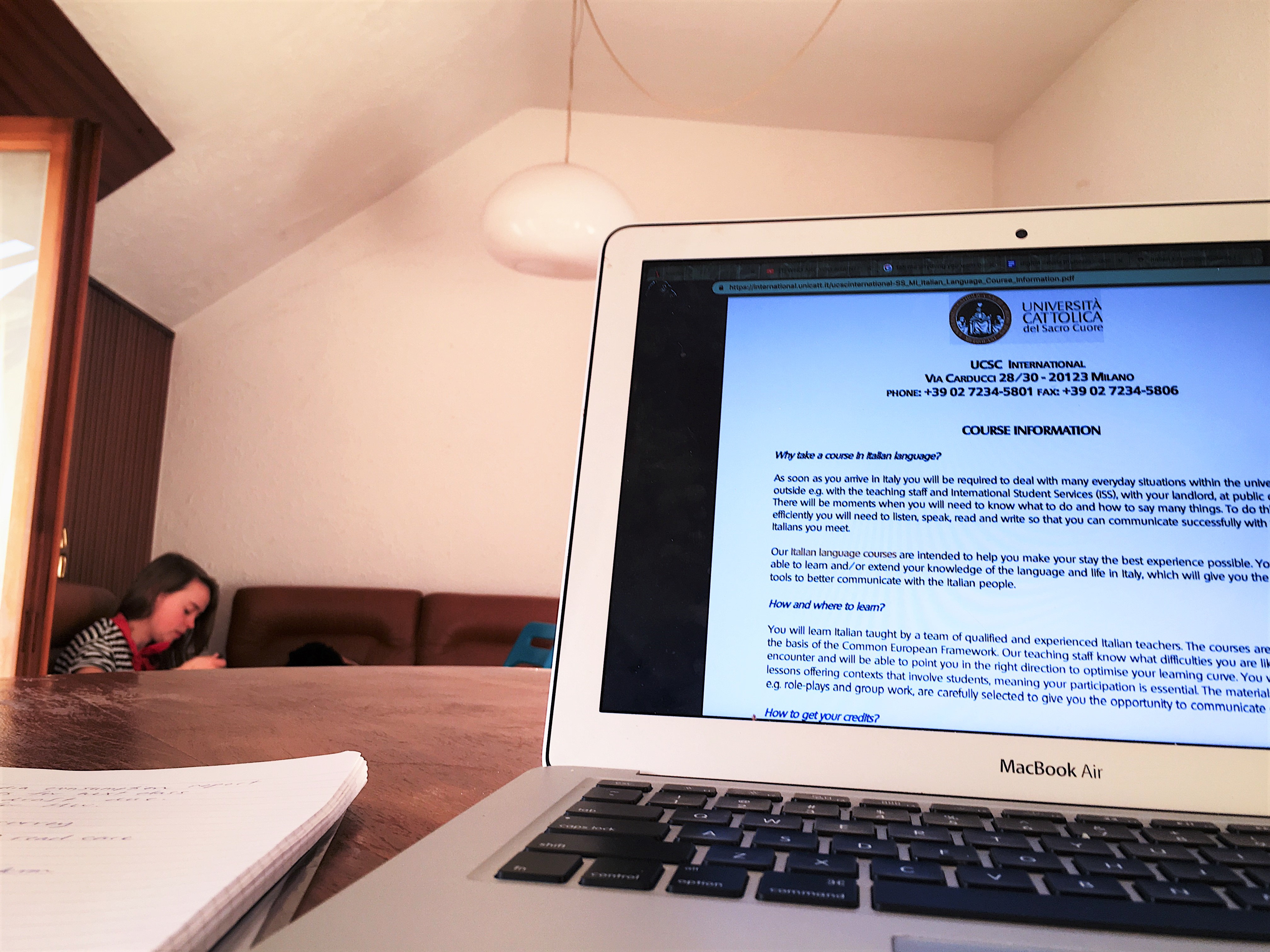So, even though my arm is sore right now, this has been a really fun day. I have noticed that life abroad can be very challenging at times; all the cultural differences and language barriers can be overwhelming, but there is never at totally bad day. Every day has moments that can get you down, like going to a class and not understanding what was going on or getting soaking wet while trying to get to school. But there are also amazing little moments, like being able to walk through centuries-old alleyways and eat fresh seafood in a picturesque European cafe that remind me how incredibly lucky I am to be living in Italy.
When students prepare to study abroad, many people take the strategy I took: saving up a lot of elective credits. I decided, with my electives, to challenge myself by exploring some new subjects. When it came time to register for classes at Universita Cattolica del Sacro Cuore, I signed up for 4 courses completely out of my comfort zone. Here is what I’ve learned about how to take a challenging course abroad.
Mentally Prepare
The truth is, even if you sign up for a class you’ve always dreamed of, you might dread the first day. I was scared to even sign up for some of the classes I’m taking, let alone attend them. When you are facing a moment of intentional change, you feel nervous not only because you know that you’re about to experience something different, but also because you made the choice to change. Embracing change you can’t escape is one thing, but changing for the purpose of growth is brave in a different and very admirable way. So let yourself feel nervous! It’s natural. But let yourself feel proud too. And no matter how nervous you feel, sign up for that class anyway. And show up on the first day. Trust me.
Read Up
Reading a syllabus full of information you don’t know can be overwhelming. Do read the syllabus, and read carefully. When I was signing up for classes, I was so busy looking for things on the syllabus I didn’t recognize, I almost failed to notice a magical phrase: Prerequisites required: none. If your syllabus says this, sign up! If a class has no prerequisites, that means the professor will approach the class with an open mind and tailor it to the experience of the students. This may also be true if the class includes international students or is specifically for international students. Give the syllabus a scan, decide if you’re still curious about the class, and give it a shot.
All that said, don’t disregard a class just because it lists some prerequisites. It depends on what the prerequisites are, and if they’re required. The best way to clarify is by emailing the professor. If the syllabus clearly states you must have taken a specific course or subject that you’ve never taken, it’s best to look for a different class. But if you’re unsure, or if the prereqs are only suggestions, just explain your situation to the professor and ask if they feel the class would be a good fit for you. Most professors don’t want to set you up for failure, so they’ll tell you if it’s a bad idea. Likewise, if they think you should take the class, that’s an opinion worth valuing in your decision.
Get Comfortable with Being Uncomfortable
Be honest about your experiences, but don’t be self-detrimental. This is something to keep in mind from the beginning. In the past, I’ve pretended to understand something when I really didn’t understand it. It’s not that I was lying per se, rather, I was trying to save time for the professor and other people in class. I figured I would catch up eventually. Don’t do this! You might catch up all on your own, but it’s not a chance you want to take if you’re trying to learn an entirely new subject. In language classes, usually you take a placement test so that you’re placed into a course appropriate to your skill level. Pretend every class is like this. Be honest about your starting skill level so that you can start on the right path.
Reach Out
Unlike international students, local students are already accustomed to the way the university works. This means that international students are more likely to contact professors with questions and comments. So–if your professor teaches mostly international students, or teaches both international and local students–they’re probably inundated with emails. If you like getting to know your professor, and you have the opportunity, go for it. But other students can be an almost equal and sometimes better resource. Try to meet at least one student in your class and exchange contact information. If you have a question that isn’t emergency, you can swing it by your classmate before you contact the professor. In many cases, you’ll find an answer faster this way. An added bonus is that this is a great way to get to know some people in your program.
Keep Track of Deadlines and Participation Points
Part of learning is failing. Taking on a new subject, you’ll have moments of confusion, misunderstanding, and forgetfulness. You might get a couple of bad scores along the way, it’s just the learning curve. To counteract that, cushion your grade with attendance, participation points, and extra credit if it’s offered. Try to pay attention to things like format, citation guidelines, and deadlines for assignments. If you stay on top of things like this, you can get a great class grade no matter what.
Like this Story? Also like us on Facebook.


